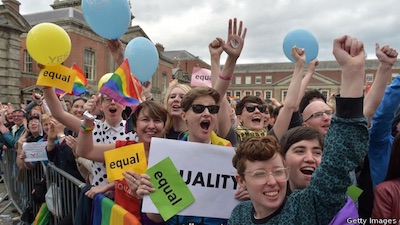
The significance of last week’s referendums and by-election results are still being debated amid claims that Ireland’s political and social landscape have been transformed by the approval of a public vote on same-sex marriage.
Ireland voted in favour of same-sex marriage by 62.1% last Friday. The country had woken up to a “kinder, more accepting Ireland” according to Brian Sheehan, the co-director of the Yes Equality campaign. Colleague Grainne Healy said it was a “transformative day” and a “turning point” in Irish history that will allow so many gay people “fulfill their full potential”.
The vote in favour ranged from 75% in Dublin South-East and over 70% across much of the eastern seaboard, to just over 50% in western, northern and rural areas. The ‘No’ vote was in a majority in one constituency, Roscommon-South Leitrim, which voted against the referendum by 51.4%. There was just 33 votes between the sides in Donegal South-West, and the other northerly constituencies were also evenly matched.
The colourful celebrations by ‘Yes’ campaigners were laden with emotion as the results rolled in at Dublin Castle on Saturday.
Robert Stevenson, 62, who is from Dublin but now lives in Britain, was tearful as he recalled how he was “suicidal” as a teenager and lost several friends to suicide because they were “filled with self-loathing” because of their sexuality.
“This is the first time I’ve felt like an equal citizen; I just can’t talk,” he said.
In the middle of the cheers and impromptu renditions of the Irish national anthem, 28-year-old Edward Smith, also fought back tears.
“It’s about equality--it’s not just about the LGBT community; this is a huge leap forward for a tiny country in becoming a secular state,” he said.
Sinn Fein leader Gerry Adams said it was a good day for equality.
“Irish people have demonstrated that we are a decent, tolerant and compassionate people,” he said.
“During the campaign we heard a lot of talk from all political parties about the need for equality. We now need to see that sentiment extended to the social and economic sphere.”
He also noted the “huge desire” among the diaspora for the right to vote, with many emigrants returning home to be part of this referendum.
“This was a very heartening experience but it underlines the need to end the disenfranchisement of the diaspora. Emigrants and citizens in the North should not be denied a voice in our democracy,” he said.
Pressure has also mounted to end discrimination in the Six Counties. LGBT activists are already targeting the notorious homophobia of some of the North’s leading unionist politicians. A march and rally through Belfast for ‘civil marriage equality’, backed by the Irish Congress of Trade Unions, is planned for June 13.
The issue of marriage equality has failed four times to win the required support in the assembly, with a Sinn Fein motion last month defeated by just two votes following absences from a number of SDLP and Alliance representatives, despite their parties’ official position.
However, the DUP have indicated they will continue to use a unionist ‘petition of concern’ which will veto any change in the law.
Young President Vote Rejected
There was not all joy for equality campaigners in the South, however, as a proposal to allow younger people to run for President of Ireland was defeated by a decisive 73.1 per cent to 26.9 per cent.
Voters were asked if they wanted to eliminate an ageist article in the constitution which sets the minimum age for Presidential candidates at 35.
Fianna Fail councillor Jim O’Callaghan had accused the government of running an “inept” campaign while his party colleague, Senator Averil Power, described the decision to hold the referendum as a “bizarre choice”.
The media in general ignored the referendum, and the government ministers who proposed it never campaigned for it. Taoiseach Enda Kenny said the ballot had gotten “sidelined” by the level of focus that had been given to the marriage equality vote.
Sinn Fein pointed out that there were constitutional issues of greater significance which the government have failed to address.
“The Presidential Age Referendum though worthy in itself, was essentially a tick boxing exercise by the government. Extending voting rights to the young, the diaspora or Irish citizens would have had a greater impact on our democracy,” said party spokesperson Padraig MacLochlainn.
Fianna Fail crisis
Meanwhile, despite winning the Carlow-Kilkenny byelection, Fianna Fail leader Micheal Martin has faced internal and external criticism for taking a back seat in the referendum campaigns. Party heavyweight Sean Haughey has since refused to say if he supported the referendum, motivating Senator Averil Power to quit the party this week.
Often described as a leader without followers, Martin received a boost last weekend with his party’s first by-election victory for almost 20 years. Welcoming the election of Bobby Aylward with 27.8% of the vote, he said it would “give momentum” to his party. polls.
Fine Gael’s David Fitzgerald came second to Mr Aylward with a 20.6% vote share -- a drop of 15% -- while Sinn Fein’s Kathleen Funchion was third with 16.2%, an increase of 6.7% since the 2011 general election.
Lucinda Creighton’s new right-wing Renua party took 9.5% to come in fourth, and beat off Labour’s Willie Quinn, who received only 7%, less than half of its previous strength.
![[Irish Republican News]](https://republican-news.org/graphics/title_gifs/rn.gif)
![[Irish Republican News]](https://republican-news.org/graphics/title_gifs/harp.gif)

